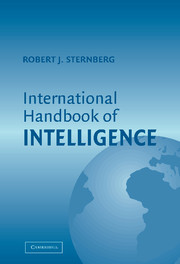Book contents
- Frontmatter
- Contents
- List of Contributors
- Preface
- 1 Intelligence Research and Assessment in the United Kingdom
- 2 Intelligence – Theory, Research, and Testing in the Nordic Countries
- 3 The Psychology of Human Intelligence in Spain
- 4 Psychology of Human Intelligence in France and French-Speaking Switzerland
- 5 Research on Intelligence in German-Speaking Countries
- 6 Is It Possible to Study Intelligence Without Using the Concept of Intelligence? An Example from Soviet/Russian Psychology
- 7 Intelligence Theory, Assessment, and Research: The Israeli Experience
- 8 Intelligence and Intelligence Testing in Turkey
- 9 Intelligence: What Is Indigenous to India and What Is Shared?
- 10 Japanese Conception of and Research on Human Intelligence
- 11 Diligence Makes People Smart: Chinese Perspectives of Intelligence
- 12 Similar Thoughts under Different Stars: Conceptions of Intelligence in Australia
- 13 Being Intelligent with Zimbabweans: A Historical and Contemporary View
- 14 Intelligence Research in Latin America
- 15 North American Approaches to Intelligence
- 16 Human Intelligence: From Local Models to Universal Theory
- Index
- References
9 - Intelligence: What Is Indigenous to India and What Is Shared?
Published online by Cambridge University Press: 05 June 2012
- Frontmatter
- Contents
- List of Contributors
- Preface
- 1 Intelligence Research and Assessment in the United Kingdom
- 2 Intelligence – Theory, Research, and Testing in the Nordic Countries
- 3 The Psychology of Human Intelligence in Spain
- 4 Psychology of Human Intelligence in France and French-Speaking Switzerland
- 5 Research on Intelligence in German-Speaking Countries
- 6 Is It Possible to Study Intelligence Without Using the Concept of Intelligence? An Example from Soviet/Russian Psychology
- 7 Intelligence Theory, Assessment, and Research: The Israeli Experience
- 8 Intelligence and Intelligence Testing in Turkey
- 9 Intelligence: What Is Indigenous to India and What Is Shared?
- 10 Japanese Conception of and Research on Human Intelligence
- 11 Diligence Makes People Smart: Chinese Perspectives of Intelligence
- 12 Similar Thoughts under Different Stars: Conceptions of Intelligence in Australia
- 13 Being Intelligent with Zimbabweans: A Historical and Contemporary View
- 14 Intelligence Research in Latin America
- 15 North American Approaches to Intelligence
- 16 Human Intelligence: From Local Models to Universal Theory
- Index
- References
Summary
The story is told of a discourse on mind, self, and intelligence that occurs in one of the seminal books of traditional knowledge, the Upanishad (Radhakrishnan, 1953). There is a learned man, Narada, who commutes between the land of gods and humans – he is dissatisfied in spite of his knowledge of books, which he teaches to humans; he wishes to know the nature of the self. He seeks out a wise man who is innocent of scriptural and book knowledge but is virtuous and practices love for all; this man is truly innocent like a five-year-old child. But he knows about the self. Narada asks him for lessons on self-knowledge, because he has heard that those who have such knowledge live beyond sorrow, and Narada says he is sad because he cannot cross over to the other side of sorrow! The wise man tells Narada to describe what knowledge he has already acquired, and then they can discuss how to go beyond it.
NAME, SPEECH, AND MIND
Narada's knowledge is vast – he knows the scriptures, mathematics and astronomy, medicine, warfare and weapons, the science of natural disasters, serpents, and the fine arts of dance and music. The boy-like wise man remarks that is good, you know the Name (declarative and procedural knowledge?), and as far as nomenclature goes, you should pursue it and be happy.
- Type
- Chapter
- Information
- International Handbook of Intelligence , pp. 270 - 301Publisher: Cambridge University PressPrint publication year: 2004
References
- 6
- Cited by

